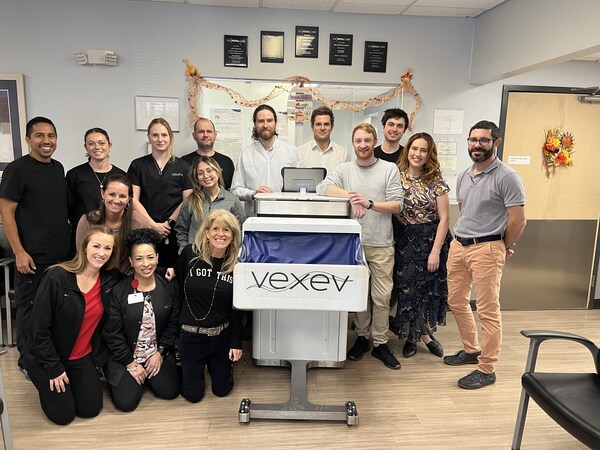Top Stories
Vexev and U.S. Renal Care Conclude Enrollment in Pioneering AV Fistula Trial

On July 30, 2025, Vexev, an Australian medical device company, and U.S. Renal Care, a prominent provider of dialysis services in the United States, announced the successful completion of patient enrollment in the CANSCAN clinical trial (NCT06691672). This innovative multi-center study aims to assess the feasibility of using semi-autonomous ultrasound scanning for arteriovenous (AV) fistula mapping in dialysis clinics.
Groundbreaking Technology for Kidney Care
The CANSCAN trial has enrolled 120 patients suffering from chronic kidney disease to evaluate the VxWave Ultrasound Imaging System. This system is designed to simplify the process of vascular mapping, which is essential for establishing permanent vascular access points for dialysis patients.
Dr. Varshi Broumand, an Interventional Nephrologist at South Texas Renal Care Group and Principal Investigator of the CANSCAN Study, emphasized the significance of the VxWave system. “This technology could eliminate one of the major obstacles in creating vascular access,” he stated. “Patients could undergo vascular mapping in their dialysis facility, streamlining the process of obtaining permanent access.”
AV fistulas create a crucial connection between an artery and a vein, usually in the arm, allowing for efficient blood flow during dialysis treatments. The VxWave Ultrasound Imaging System employs advanced robotics and machine learning to produce detailed 3D vascular models and reports, enhancing the evaluation of access points right at the point of care.
Potential Impact on Patient Care
Dr. Shannon Thomas, Chief Medical Officer at Vexev, expressed enthusiasm about the future implications of this technology. “This trial is a step toward a future where intelligent machines can perform high-precision imaging without manual intervention,” he noted. “It’s not just about improving lab results; it’s about changing lives.”
Dr. Geoffrey A. Block, Associate Chief Medical Officer at U.S. Renal Care, highlighted the commitment to innovation in kidney disease treatment. “The CANSCAN trial opens the door to integrating semi-autonomous ultrasound into our workflow, potentially improving patient outcomes by facilitating timely access to life-saving procedures,” he explained.
Both companies aim to enhance the quality of care for the millions of individuals living with end-stage kidney disease. The results of this trial could pave the way for broader implementation of robotic ultrasound technology in clinical settings, ultimately transforming patient experiences in dialysis.
About the Companies Involved
Founded in 2018, Vexev is an Australian med-tech startup established by Drs. John Carroll and Eamonn Colley, graduates of the University of New South Wales. The company is dedicated to advancing vascular imaging solutions to improve patient lives.
U.S. Renal Care is the fastest-growing dialysis provider in the United States, collaborating with nephrologists across 32 states to support over 36,000 patients with kidney disease. Since its inception in 2000, U.S. Renal Care has prioritized clinical quality and innovation, striving to deliver the best possible outcomes for its patients.
For more information about Vexev and U.S. Renal Care, please visit their respective websites: Vexev.com and USRenalCare.com.
-

 World5 months ago
World5 months agoSouth Korea’s Foreign Minister Cho Hyun to Visit China This Week
-

 Business5 months ago
Business5 months agoStarling Bank Plans Secondary Share Sale, Targeting $5.4 Billion Valuation
-

 Top Stories5 months ago
Top Stories5 months agoMunsang College Celebrates 100 Years with Grand Ceremony
-

 World5 months ago
World5 months agoPAS Aims to Expand Parliamentary Influence in Upcoming Election
-

 Business7 months ago
Business7 months agoKenvue Dismisses CEO Thibaut Mongon as Strategic Review Advances
-

 Lifestyle6 months ago
Lifestyle6 months agoHumanism Camp Engages 250 Youths in Summer Fest 2025
-

 Sports6 months ago
Sports6 months agoDe Minaur Triumphs at Washington Open After Thrilling Comeback
-

 Sports7 months ago
Sports7 months agoTupou and Daugunu Join First Nations Squad for Lions Clash
-

 Top Stories7 months ago
Top Stories7 months agoColombian Senator Miguel Uribe Shows Signs of Recovery After Attack
-

 World7 months ago
World7 months agoASEAN Gears Up for Historic Joint Meeting of Foreign and Economic Ministers
-

 Health6 months ago
Health6 months agoNew Study Challenges Assumptions About Aging and Inflammation
-

 Business7 months ago
Business7 months agoOil Prices Surge Following New EU Sanctions on Russia









